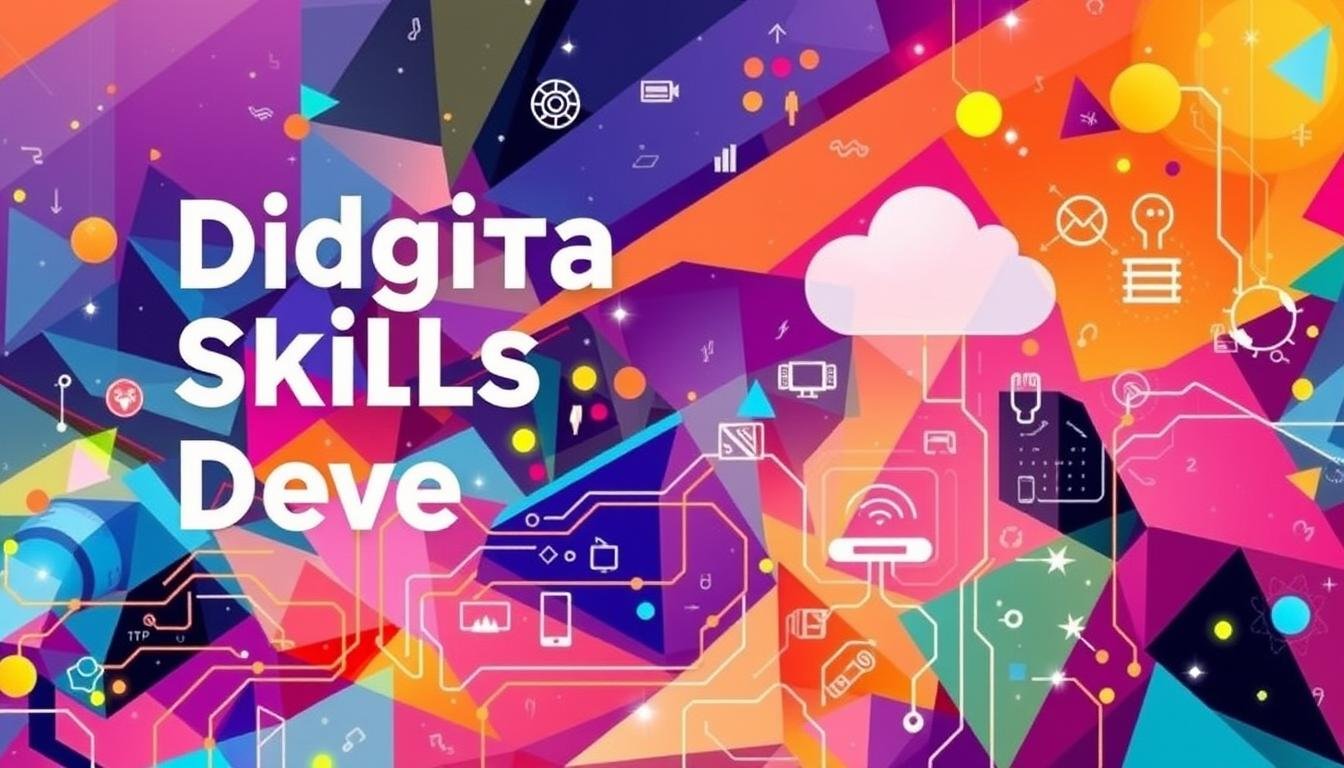In a realm where technological advancements are unfolding at an unprecedented pace, the imperative for digital skills proficiency in professional settings becomes increasingly evident. The transformation of job markets necessitates a paradigm shift, positioning digital skills development as a critical imperative for both individuals and entities. This exhaustive guide delves into the pivotal role of online learning and e-learning platforms, arming you with the requisite tools for seamless technology integration and perpetual adaptation to evolving landscapes.
Prepare to delve into the core elements of digital skills enhancement and attaining future-readiness in your professional pursuits.
Key Takeaways
- Understanding the critical importance of digital skills development in today’s job market.
- Exploring how online learning and e-learning platforms can enhance skill acquisition.
- Recognizing the need for continuous adaptation to technological changes.
- Identifying effective strategies for personal and corporate training in digital skills.
- Evaluating the importance of certifications in advancing career opportunities.
Understanding Digital Skills Development
In the era of technology, digital skills development is paramount for navigating today’s job market complexities. Grasping the essence of digital skills and their importance empowers both individuals and organizations. This understanding is vital in today’s digital landscape.
Definition of Digital Skills
Digital skills encompass the proficiency to utilize digital devices, communication applications, and networks for information access and management. Achieving mastery in these areas enhances digital literacy, a fundamental requirement in our digital age. Employers increasingly value candidates proficient in diverse digital tools and platforms, making digital skills indispensable for workforce readiness.
Importance in Today’s Job Market
With technology deeply embedded in nearly all professions, possessing robust digital skills is imperative for employability. Companies now prioritize candidates skilled in social media engagement, data analysis, and online collaboration tools. Participating in upskilling programs is essential for staying competitive. Studies indicate that individuals with advanced digital skills enjoy superior job prospects and career advancement opportunities. For further insights, refer to this article that delves into the evolving workforce demands.
Key Digital Skills for the Modern Workforce
In today’s rapidly evolving job market, mastering a diverse range of digital skills is imperative for success. Employers prioritize candidates who demonstrate both technical expertise and interpersonal abilities crucial for effective collaboration in a digital environment. Below are some key skills that define the modern workforce.
Essential Technical Skills
Familiarity with technology forms the backbone of digital skills development. Individuals should acquire competencies in:
- Software applications
- Coding languages
- Cybersecurity measures
- Data analytics tools
These technical capabilities are not only foundational but also expand opportunities in various industries. Engaging in online learning, especially through interactive courses, can significantly enhance these essential skills.
Soft Skills Needed in the Digital Era
Alongside technical proficiency, soft skills have become increasingly vital. Skills such as:
- Adaptability
- Problem-solving
- Emotional intelligence
emphasize the importance of personal attributes in the digital workspace. Employers value candidates who can navigate challenges and collaborate effectively, underscoring the need for a well-rounded approach to digital skills development.
Digital Communication Proficiencies
As remote work becomes more common, mastering digital communication tools becomes necessary. Key proficiencies include:
- Email etiquette
- Video conferencing skills
- Project management software
Being comfortable with these tools enhances collaboration and productivity, further advancing one’s career. Continuous practice through online learning technologies can readily improve these proficiencies.
The Role of Education in Digital Skills Development
Education is pivotal in arming individuals with competencies requisite for the digital era. The ascendancy of online learning has introduced novel avenues for skill acquisition, diverging from traditional methodologies. This dichotomy elucidates the distinct advantages and disadvantages of each approach.
Traditional Learning vs. Online Platforms
Traditional education, characterized by face-to-face interactions within a structured setting, has long been the bedrock of skill acquisition. This format engenders a communal atmosphere, yet its rigidity and limited accessibility can hinder those with demanding schedules. Conversely, e-learning platforms, replete with diverse multimedia resources, cater to a myriad of learning styles. They empower individuals to navigate their educational journey at their own tempo, thereby democratizing access to digital competencies.
Advantages of Online Learning
Online learning offers manifold benefits that significantly enhance the educational experience:
- Flexibility: Learners can engage with courses at their convenience, facilitating a harmonious balance between professional and personal obligations.
- Accessibility: The proliferation of e-learning platforms ensures that a broad spectrum of educational content is accessible to those who may be precluded from traditional educational settings.
- Diverse Resources: Virtual training encompasses a plethora of educational materials, including videos, articles, and interactive quizzes, which can significantly bolster knowledge retention.
Learning Platforms for Digital Skills Development
In the rapidly evolving technological sphere, e-learning platforms are indispensable for remote skill-building. They offer a plethora of resources, catering to various learning preferences. This enables individuals to refine their digital competencies at their convenience. The availability of multimedia tutorials allows learners to select formats that align with their individual learning styles, thereby enhancing the educational experience.
Overview of Popular E-Learning Platforms
Coursera, Udemy, and LinkedIn Learning stand out among e-learning platforms. They provide a wide range of courses aimed at enhancing digital skills across multiple disciplines. Coursera collaborates with prestigious universities, offering professional certifications for those pursuing formal credentials. Udemy boasts a vast collection of courses, spanning from programming to graphic design, catering to specialized interests. LinkedIn Learning, meanwhile, integrates professional development with customized learning plans, facilitating the acquisition of advanced skills.
Comparing Free vs. Paid Resources
The decision between free and paid educational content profoundly influences the learning journey. Free resources typically offer foundational knowledge and introductory courses, accessible to all. Platforms such as Google’s learning platform provide valuable content without cost, ideal for beginners. Conversely, paid subscriptions unlock premium materials, expert guidance, and personalized support, crucial for advanced remote skill-building. Assessing the advantages and disadvantages of each option is essential for making an informed choice aligned with one’s educational objectives.
Assessing Your Current Digital Skills
Grasping the extent of your digital proficiency is paramount for personal and professional advancement. Leveraging self-assessment tools is crucial for determining your digital literacy level. These instruments reveal your competencies’ strengths and weaknesses, steering you toward necessary upskilling initiatives.
Self-Assessment Tools
Employing self-assessment tools facilitates a more precise understanding of your digital capabilities. Consider these effective methodologies:
- Skill matrices: Chart your current skills against industry standards.
- Online quizzes: Quick assessments can offer immediate insights into your digital abilities.
- Benchmarking: Compare your skills with peers or industry benchmarks to identify gaps.
These tools facilitate a comprehensive evaluation of your digital literacy.
Setting Skills Improvement Goals
Following the assessment, setting specific improvement goals is imperative. Utilizing the SMART criteria ensures your objectives are both attainable and impactful:
- Specific: Define clear, distinct goals.
- Measurable: Establish metrics for tracking your progress.
- Achievable: Set realistic targets that can be reached.
- Relevant: Align goals with your long-term career aspirations.
- Time-bound: Set a timeline for achieving your goals.
This structured methodology fosters targeted learning, thereby enhancing your digital skills efficiently.
Building a Customized Learning Plan

Embarking on the acquisition of digital skills necessitates the creation of a personalized learning plan. This endeavor requires a deep understanding of one’s learning style and the effective allocation of time. Such an approach not only optimizes the learning experience but also enhances the enjoyment and productivity derived from online and interactive courses.
Identifying Personal Learning Styles
Accurate identification of one’s learning style is paramount for efficacious study. Whether inclined towards visual, auditory, reading/writing, or kinesthetic modalities, tailoring educational resources to these preferences can significantly boost retention and engagement. The incorporation of diverse mediums such as charts, videos, and hands-on projects in interactive courses can cater to individual preferences, thereby enriching the digital skills development process.
Integrating Time Management Techniques
Effective time management is crucial for sustained commitment to learning. Techniques like the Pomodoro Technique, which divides study sessions into focused intervals, can enhance productivity. Similarly, time-blocking, which involves dedicating specific periods to learning, ensures that educational goals are prioritized. The integration of these strategies fosters sustained motivation and efficiency throughout the learning journey.
Corporate Training Programs for Digital Skills
Companies are increasingly recognizing the value of corporate training programs as a means to enhance the digital skills of their workforce. Investing in upskilling programs not only fosters employee growth but also drives overall productivity and adaptability within the organization.
Benefits of Upskilling Employees
Organizations that engage in robust upskilling programs often experience numerous advantages. Some of these benefits include:
- Improved productivity: Workers become more efficient and effective in their roles.
- Reduced turnover: Employees are more likely to stay with a company that invests in their development.
- Increased adaptability: A well-trained workforce can better respond to technological changes and market demands.
These programs not only motivate employees but also create a culture of continuous learning, essential in today’s fast-paced business environment. Businesses seeking to implement effective strategies can explore options for engaging corporate training solutions.
Examples of Successful Corporate Training Programs
Leading companies like Google and IBM showcase how effective corporate training can reshape working environments. For example:
- Google: Offers various upskilling opportunities, notably through their Google Career Certificates, which provide pathways to jobs in high-demand fields.
- IBM: Has developed multiple online learning initiatives, including the IBM Skills Academy, aimed at equipping employees with critical technical knowledge.
These success stories illustrate the power of comprehensive corporate training initiatives in improving company dynamics and enhancing competency among employees. Organizations interested in these processes will find valuable insights in such examples.
The Importance of Continuous Learning
In an era marked by rapid technological advancements, the imperative of continuous learning becomes increasingly evident. Adopting a lifelong learning mindset significantly augments one’s digital literacy and ensures professional relevance across diverse sectors. By staying abreast of emerging trends and adapting to evolving job roles, individuals can maintain their competitive edge.
Adapting to Technological Changes
Technological evolution necessitates the acquisition of new skills to navigate effectively. Continuous education empowers individuals to remain competitive in the job market, fostering an understanding of critical tools and applications. The advent of remote skill-building enables professionals to access training from anywhere, facilitating adaptation without geographical constraints.
Networking and Community Learning
Engagement with peers is crucial for motivation and knowledge exchange. Involvement in groups or forums, such as those on LinkedIn, facilitates discussions on digital literacy challenges and collaborative solutions. In-person gatherings, like those organized through Meetup, further solidify community bonds, offering comprehensive learning experiences.
Identifying optimal avenues for community learning significantly enhances the skill-building journey. For detailed guidelines and policies on these opportunities, refer to our terms of use. Continuous learning not only enhances individual competence but also cultivates a supportive network that promotes collective progress.
Digital Skills Development for Career Advancement

In today’s competitive job market, the ability to navigate the digital landscape is crucial. Robust digital skills can not only differentiate candidates but also open doors to a variety of career paths. As organizations increasingly embrace technology adoption, employees equipped with the right skills are more likely to succeed.
How Digital Skills Can Enhance Job Opportunities
Possessing strong digital skills significantly enhances employability. Employers actively seek individuals who can demonstrate proficiency in technology, problem-solving, and adaptability. As a result, candidates with expertise in digital communication, data management, and online collaboration tools often stand out.
- Improved Job Marketability: Digital skills development showcases readiness for various roles.
- Broader Career Paths: Skills in technology open avenues in fields ranging from marketing to IT.
- Higher Earning Potential: Proficiency in digital tools often correlates with higher salary offerings.
The Importance of Certifications
Certifications play a vital role in validating capabilities in the eyes of employers. Recognized credentials enhance a candidate’s profile and can lead to increased job opportunities. Online learning platforms, such as Coursera and CompTIA, offer opportunities to earn certifications that showcase professional growth and commitment to digital skills development.
- Validation of Skills: Certifications provide tangible proof of competency.
- Competitive Edge: Holding relevant certifications can differentiate candidates in a crowded job market.
- Networking Opportunities: Certification programs often include access to professional communities.
Future Trends in Digital Skills
The realm of digital skills development is perpetually evolving, driven by technological advancements and shifts within the workforce. As technology’s adoption rate surges, it becomes imperative for both individuals and entities to grasp the emerging trends. This understanding is critical for ensuring readiness to fulfill future demands.
The Rise of Automation and AI
Automation and artificial intelligence are revolutionizing job roles, with machines assuming responsibility for repetitive tasks. Adaptability emerges as a paramount skill for workers, as it becomes essential to complement the capabilities of machines. Skills such as creativity and interpersonal relations, which machines struggle to replicate, will hold immense value. This transformation is manifest across various sectors, with companies increasingly leveraging AI to enhance productivity. The emphasis on human-centric skills will be paramount for those navigating the evolving work environment.
Emerging Technologies Impacting Skills
Innovations like blockchain, virtual reality, and augmented reality are redefining industries, necessitating specialized knowledge and competencies. Staying abreast of these advancements enables professionals to align their skills with emerging opportunities. Fields such as digital currencies and immersive experiences require a deep understanding of relevant technologies, underscoring the importance of continuous education for career advancement. For insights into how these innovations intersect with regulatory frameworks, explore digital compliance laws that influence workplaces today.
Overcoming Barriers to Digital Skills Development
The path to acquiring digital skills is fraught with obstacles for many. These impediments range from limited access to necessary resources to the overwhelming nature of technology itself. Acknowledging these common hurdles is the initial step towards successful remote skill acquisition.
Common Challenges Participants Face
Several obstacles frequently hinder individuals from reaching their digital skills development objectives. These include:
- Access to resources: Insufficient resources can severely limit learners’ opportunities to expand their skill repertoire.
- Intimidation by technology: The unfamiliarity with new technologies can cause apprehension, leading to a reluctance to engage with tools that could facilitate learning.
- Lack of direction: Without a clear roadmap, learners often become disoriented and lack the motivation to pursue their learning goals.
Strategies for Staying Motivated
It is essential to maintain motivation throughout the remote skill-building process. Effective strategies to sustain engagement include:
- Set incremental goals: Dividing larger objectives into smaller, attainable tasks fosters a sense of accomplishment and direction.
- Find an accountability partner: Working alongside someone with similar learning objectives can enhance motivation and provide support during challenging times.
- Celebrate achievements: Recognizing and celebrating milestones can significantly boost morale and encourage continued advancement.
For further insights into creating an optimal learning environment and understanding cookie policies, visit this resource.
Resources for Ongoing Support and Learning
Embarking on the path to digital literacy necessitates the strategic utilization of diverse resources. Engaging with seminal works in the realm of digital skills development offers profound insights, augmenting the efficacy of online learning endeavors. Initiating your exploration, consider perusing influential titles listed on Goodreads, which cover pivotal aspects of digital proficiency. Furthermore, scholarly articles on ResearchGate provide nuanced perspectives on evolving digital trends and practices, thereby expanding your knowledge base.
Recommended Books and Articles
Delving into recommended books and articles that dissect various dimensions of digital skills is another efficacious strategy. These resources not only augment your educational journey but also serve as indispensable references for future reference. The informative literature at your disposal facilitates the clarification of complex concepts, thereby fostering a more profound engagement with the material encountered during your online learning endeavors.
Online Communities and Forums
Engagement with like-minded individuals significantly enhances the learning experience. Online communities and forums, such as those on Reddit and LinkedIn groups, offer platforms for learners to share their experiences, pose inquiries, and extend support. Participating in these discussions within these groups cultivates a collaborative atmosphere, crucial for those aspiring to enhance their digital skills. Through active participation in these online forums, you can exchange perspectives and acquire invaluable insights that propel your digital literacy journey forward.

